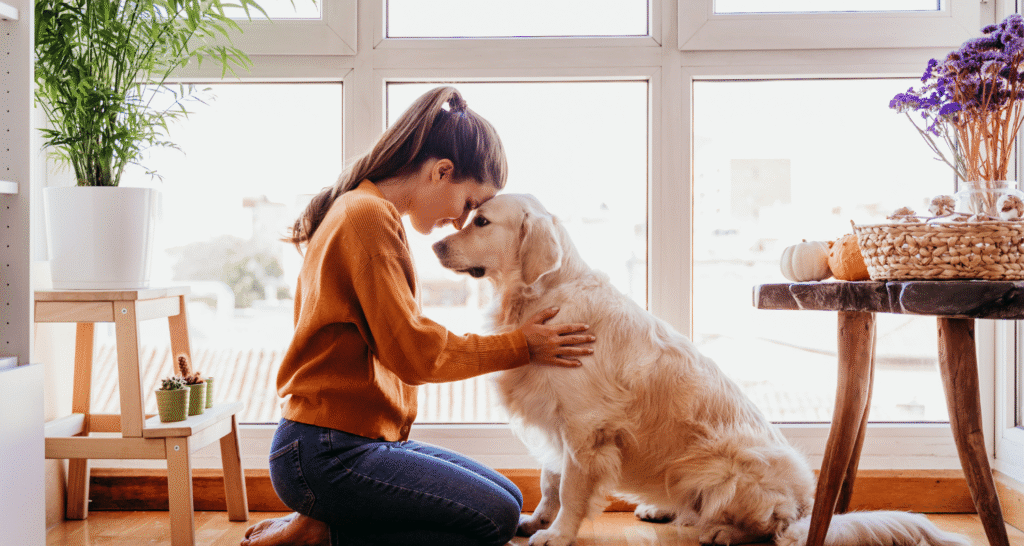Why Ambiguous Pet Loss Feels Different
Most people associate pet loss with death, but not all grief comes with a clear goodbye. When your pet goes missing, is stolen, or you’ve had to rehome them due to circumstances beyond your control, the heartbreak can feel just as intense—if not more complicated. This type of loss is called ambiguous grief, and it leaves many pet parents caught between hope and despair.
How Ambiguous Loss Disrupts Emotions
One of the hardest parts of ambiguous pet loss is the emotional limbo it creates. When there’s no clear closure — as when a pet is missing or rehomed — your heart doesn’t know where to land. You might cycle between hope and despair, guilt, longing and anger, sometimes all within the same day. Without a clear goodbye, it can feel nearly impossible to move through grief in the way we expect. Psychologist Pauline Boss, who coined the term ambiguous loss, notes that this kind of loss can freeze the grieving process because your brain is searching for answers it may never get (Boss, 2006). The result is an exhausting emotional rollercoaster that can leave you feeling stuck and misunderstood — even by yourself.

The Role of Guilt — And What It Really Means
Ambiguous grief often comes with a heavy side of guilt. You might replay scenarios in your mind: What if I’d shut the door faster? What if I had kept them despite the landlord’s rules? It’s natural to feel responsible. But it’s important to understand what guilt truly is.
Genuine guilt involves intent — choosing to do harm or act neglectfully. We sometimes make mistakes, ones we desperately regret. But mistakes are not moral failures. And in the case where a pet had to be re-homed, pet parents in these situations were doing their best under painful or impossible circumstances. Recognizing these differences – mistakes, oversights, dilemmas – can help you approach yourself with more compassion (Neimeyer, 2016).
How to Cope: Some Suggestions
There’s no single roadmap for grieving a pet whose fate is uncertain, but there are healthy ways to navigate the pain and find moments of peace:
- Acknowledge and Validate Your Grief
It’s common for people around you to minimize your pain. Dismissive comments can make you doubt your right to grieve. Remind yourself: your bond with your pet was unique and meaningful and you are entitled to grieve. - Honor Your Bond with Rituals
Rituals help anchor your grief in a tangible, concrete way. Create a small memorial space at home with your pet’s photo, collar, or favorite toy. Write them letters expressing love and updates. These actions help transform invisible pain into visible love. - Set Boundaries Around Searching and “What-Ifs”
Many pet parents feel compelled to endlessly search—posting flyers, checking shelters, calling vets. While it’s natural to want answers, perpetual searching can become emotionally draining. Instead, decide ahead of time how often you’ll check for updates or how long you’ll maintain active searches. Setting these boundaries allows you to grieve while preserving your emotional and physical energy. - Seek Support From People Who Understand
Ambiguous grief is often misunderstood, so surrounding yourself with compassionate listeners is essential. This could mean a pet loss support group, a therapist who understands disenfranchised grief, or online communities focused on missing or rehomed pets.. - Practice Gentle Self-Compassion
The voice of guilt can be relentless. Try countering it with compassionate self-talk: “I never intended for any harm to come to my pet. What happened was an awful event, not a reflection of my love and character.” Mindfulness exercises, journaling, or even talking aloud to your pet as if they could hear you can bring relief.
Know When to Seek Professional Help
If you find yourself consumed by despair or unable to function, you don’t have to carry the weight alone. Therapists trained in grief, especially ambiguous loss, can offer tailored coping strategies and a safe space for your pain.
Moving Toward Healing
Healing from ambiguous grief doesn’t mean forgetting your pet or dismissing your love. It means learning to live with uncertainty and giving yourself permission to feel all the feelings that come — sadness, hope, guilt, even moments of peace. Over time, you can find ways to carry your pet’s memory forward while also reclaiming your own well-being.
